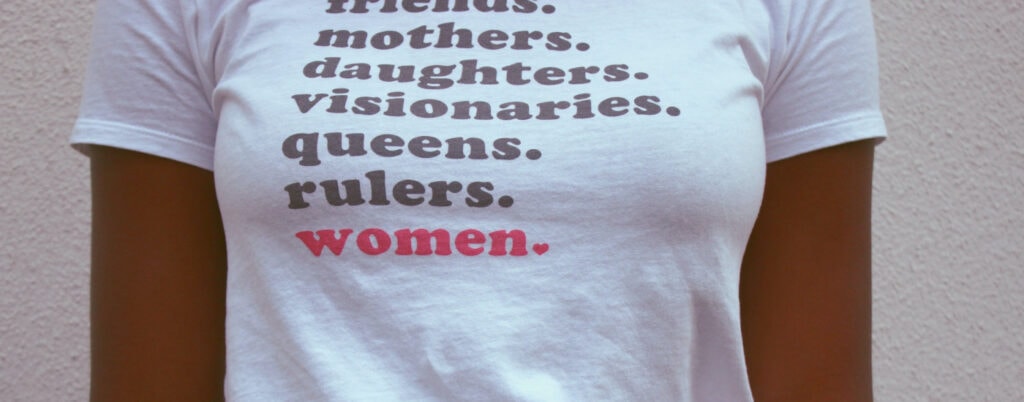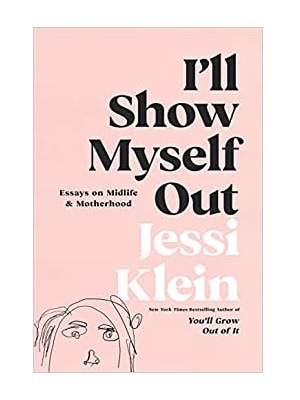Let’s Discuss: Motherhood as a Hero’s Journey
This post may contain affiliate links and CorporetteMoms may earn commissions for purchases made through links in this post. As an Amazon Associate, I earn from qualifying purchases.

If you’re familiar with this recent essay on motherhood by writer, actress, and comedian Jessi Klein, it’s a good bet that you’ve seen it shared in a moms group you belong to on Facebook. (The link was posted in at least three that I’m a member of.) If you haven’t read it yet, we highly recommend you take some time today to do so, then come back here to discuss! If you HAVE read it, we’d love to hear your thoughts.
(Here was Kat’s take on her own postpartum identity crisis…)
Klein’s essay, published in The Cut, blends the literary and the everyday to form a new perspective on motherhood that — you know what? It’s hard to do justice to Klein’s piece in a single-sentence summary, so I won’t try.
The essay is actually an excerpt from Klein’s new book of essays, I’ll Show Myself Out: Essays on Midlife and Motherhood. (Incidentally, I’m glad The Cut has changed the title from what they originally used online, “What My Toddler’s Nom-Noms Taught Me,” to “Epiphany in the Baby-Food Aisle,” because the original, slightly silly title made it easy to scroll past.)

Klein, who is 46, opens the piece by sharing that she listened to one of Oprah’s podcast interviews with Eat, Pray, Love author Elizabeth Gilbert during an errand to buy teething biscuits for her toddler. Gilbert spoke to Oprah about the literary trope of the hero’s journey, and Klein paraphrases some of her thoughts by writing in her piece that the hero’s journey “is not the exclusive territory of men … and it does not have to involve faraway lands.”
After returning home with Nom-Noms in hand and googling Joseph Campbell and the hero’s journey (Gilbert frequently cited his book, The Hero With a Thousand Faces, in the interview), Klein was immediately struck by how, as a mother, the hero’s journey felt so familiar:
What shook me about Campbell’s words is how perfectly they describe motherhood. To begin with: a “profound dream state.” The first three months after my son was born, for sure, were nothing less than a never-ending somnambulance. And even though I was not on a secret island or a lofty mountaintop, once I became a mom, I felt in my bones that deep sense of distance and isolation, of being far away from everyone else, stranded with my new “strangely fluid and polymorphous being” — i.e., my baby. If you’ve ever had a quality hang with a baby or very small child, you know a baby is as polymorphous as it fucking gets. Infants are from one minute to the next, by turns otters, mermen, humans, wombats, and puppies.
Here’s another key excerpt:
The truth is that motherhood is a hero’s journey. For most of us it’s not a journey outward, to the most fantastic and farthest-flung places, but inward, downward, to the deepest parts of your strength, to the innermost buried core of everything you are made of but didn’t know was there. And what I’ve learned is that there’s a reason motherhood as a story is so infrequently told.
It’s because, for so many people, our safest, sweetest, earliest memories are of nestling in our mother’s lap, in her rocking warmth, hearing her sing as we get milk-drunk and sleepy and burrow, heavy-eyed, into the crook of her soft arm. And if you knew that your mother’s journey was, intrinsically, a hero’s journey — if that was in any way an established narrative in our culture — you’d have to accept that this memory of womb-like safety, this foundation upon which so much of our identity is built, was often just an illusion. You’d have to realize that while you were blissed out on your mother’s lap, one of those epic battles, the kind that envelops heroes as they fight their way out of a ring of fire, was raging just above your head. No one wants to believe that in the moments you felt the most peaceful, the woman cradling you so softly was shielding you from a sword that she herself was holding.
Every mother you know is in this fight with herself. The sword that hangs over her is a sword of exhaustion, of frustration, of patience run dry, a sword of indignation at how little she feels like a human when she so often has to look and behave like an animal. Mostly, it is the sword of rage: the rage and shock of how completely she must annihilate herself to keep her child alive.
Not to hype this essay too much, BUT — I know we’re all busy as working moms (and burned out, and so on), but I really urge you to take a little time for yourself and read Klein’s perspective on the journey of being a mother. (The summarized general reaction that I’ve seen most moms have to this piece online is a blend of “Whoa” and “Wow.” Another appropriate one would be “Well, sh*t.”)
P.S. I’m pretty sure that the “toddler cookies called something like Nom-Noms” Klein refers to are really Baby Mum-Mum (toddler-mom memory unlocked!). However, “What My Toddler’s Mum-Mums Taught Me” would have been a pretty confusing essay title, no?
So, readers, please share: If you read Jessi Klein’s essay, what did you think? Did you immediately buy her book, as I did? (I admit I haven’t read it yet!) Can you relate to the concept of motherhood as a hero’s journey? Or do you see it in another way?
Social media stock photo via Pexels / Chelsi Peter (woman wearing a white T-shirt that says “mothers. daughters. visionaries. queens. rulers. women.”)

Maybe it’s because I only have one kid and a husband who is an equal partner and we had an objectively pretty boring life pre-kid, but the part about annihilating oneself for motherhood does not resonate. Sure, I have less free time now than I did pre-kid but I’m still my own person with a job, hobbies and interests completely separate from my kid and I don’t really feel like my life has changed very much since becoming a mom. It’s busier and more joyful but fundamentally still the same in many ways.
It doesn’t feel like anything I haven’t read before? TBH, I started having doubts the moment Eat Pray Love was brought into the conversation. I hated that book so much, lol.
I mostly enjoy our impromptu CMoms book club and appreciate our thoughtful discussions here. I’ll admit this piece didn’t particularly resonate with me.
American culture pushes us all towards adopting ‘mother’ as a personality trait. When this collides with a toxic combination of capitalism and conservatism, you get ‘mommy blog’, ‘boymom’, ‘mommy wine culture’, how not to hate your husband, maternal gatekeeping, et.c. et.c. I don’t need or want a dramatic reading of motherhood as mythic journey. It’s overdramatic and lip service at the same time. Just give us a f*cking childcare subsidy and paid leave for everyone…for a start. Perhaps because my kids are older (they weren’t easy by any means, they hate sleep), but motherhood is just one part of my rich and complex identity, not my entire personality. Fatherhood is one part of my spouse’s identity, not all of it; in a relationship and family where we each have (or aspire to give each other) the time and space to be whole human beings, why should my situation be different?
I’d recommend some fascinating alternatives: read Kathryn Jezer-Morton’s explorations of momfluencer culture (at the confluence of American motherhood, identity, and capitalism) on her Substack or The Cut (its new home), and also Gail Carriger’s ‘The Heroine’s Journey’ (sketched out here https://diymfa.com/reading/mythic-storytelling-journey)
I really don’t understand these viewpoints. Annihilate myself to keep my child alive? What? Maybe some days I don’t have time for full makeup but that’s about it. I love being a mother and just don’t find it that hard? I don’t feel isolated at all; in fact, I’ve made lots of mom friends and have more friends now than I did pre-kid. I don’t think that stories of motherhood aren’t told. There are entire websites devoted to essays about motherhood.
Personally, I really dislike this whole trope, and find it somewhat, we’ll, if not insulting, at least patronizing and somewhat sexist. There’s an air of patting you on the head for thinking that your trophy, the same one everyone got, represents some grand achievement.
It’s certainly interesting to me that motherhood, parenting in general, represents the most profound, amazing, transformative experience in most of our individual lives, while also being so incredibly common. But it is common; an unimaginable number of people have gone through it, the vast majority in situations far, far more difficult then mine. It’s quite special to us and our families, but it doesn’t mean we’ve gone through something heroic or extraordinary – to the world, it’s pretty mundane.
Imagine if we valued caregiving as much as say a solider fighting a war and giving benefits like paid parental leave, childcare subsidies, free college, free housing loans, etc. Or a CEO and giving lots and lots of money. We say mothers are heroes as a platitude all the time, but there are no tangible benefits given. So sure, treat me as a hero if it means actually valuing what I do.
I just read it and it doesn’t resonate for me, at all. And it’s not been easy. 5 months of colic screaming, speech delays, extreme food pickiness still persisting at 5, finally starting to sleep through the night at 5 (years, not months), my own debilitating health issues, my husband’s debilitating health issues (thank goodness they didn’t overlap), a big job that would be stressful even without a family. But there has also been so much joy. I don’t share the author’s sense of rage or shock or annihilation of herself. Being a mother to me brings so much joy to my life and it’s joy in the little things (the snuggle-hug, the peaceful sleep, the trusting hand-hold, the sense of wonderment and awe at the most mundane things you or I long ago accepted as normal). Yes it’s hard, but so much of my life is hard, and as my daughter says to me often “mommy, we can do hard things”. Being a mom, raising a girl who is going to change the world, it makes me feel more complete and gives me satisfaction in a way that was lacking in the pre-kid days. It’s a kind of bone deep satisfaction that transcends the minutes that are hard if that makes any sense at all. So, not my cup of tea, but am curious to see others’ reactions.
I found the essay to be a pat cliche. The outcome of my maternal hero’s journey is supposed to be the “impossible delight” of motherhood? I’d like to know how old Klein’s child is and whether he has special needs of any sort. For me motherhood hasn’t been a hero’s journey; rather, it’s been a human sacrifice that has entirely eviscerated me. I have recently begun my own “hero’s journey” to rediscover myself as a whole and separate person by excavating a talent that I had buried in the ground for the sake of my spouse and child.